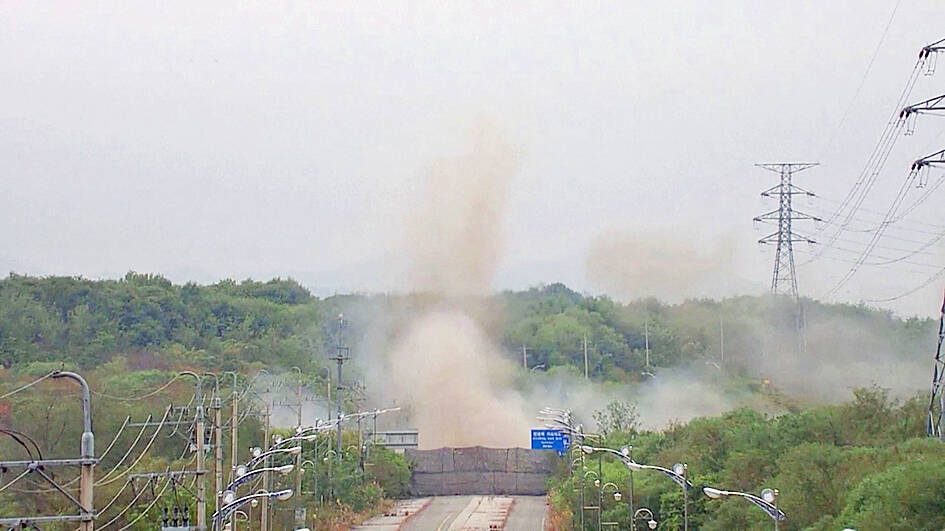North Korea is dismantling a facility at its Mount Kumgang resort used for hosting meetings between families separated after the Korean War, South Korea said yesterday, in the latest sign of strained tensions between the two Koreas.
The South Korean Ministry of Unification, which handles affairs between the nations, urged Pyongyang to immediately stop the action at the site near the border on the North’s east coast.
The 12-story building was built in 2008 with a budget of 55 billion won (US$37.86 million) funded by South Korea and includes an event hall and more than 200 guest rooms, the ministry said.

Photo: Reuters
The last tearful meeting between separated families was held at the venue in August 2018 before North Korea threatened to dismantle the resort the following year.
More than 130,000 South Koreans had registered to reunite with their separated families in the North as of December last year, with only 36,941 people still alive, government data showed.
The demolition of the facility is an “anti-humanitarian act that tramples on the wishes of separated families,” the ministry said, adding that it would consider legal measures over the action and a joint response with the international community.
The Mount Kumgang resort, located just beyond the demilitarized zone separating the two countries, was one of two major inter-Korean economic projects, along with the Kaesong industrial zone, seen as a symbol of rapprochement during decades of hostilities following the Korean War from 1950 to 1953.
North Korea blew up a joint liaison office in Kaesong in 2020 after complaining about defectors sending propaganda leaflets into the reclusive North.
North Korea has been escalating its rhetoric against its southern neighbour in recent years, designating South Korea as a “hostile state.”
Pyongyang also blew up sections of inter-Korean roads and rail lines on its side of the heavily fortified border last year, which prompted South Korea’s military to fire warning shots at the time.
Pyongyang in 2023 also scrapped a 2018 military accord designed to curb the risk of inadvertent clashes between two countries that remain technically at war, prompting the South to take a similar step.
Nonetheless, there have been signs that North Korea might be prepared to reopen to some foreign visitors for the first time in more than five years since the closure of its borders to tourism due to the COVID-19 pandemic.
Beijing-based Koryo Tours yesterday said tours to North Korea were “officially back,” with some of its staff allowed to enter the Rason area.

A Ministry of Foreign Affairs official yesterday said that a delegation that visited China for an APEC meeting did not receive any kind of treatment that downgraded Taiwan’s sovereignty. Department of International Organizations Director-General Jonathan Sun (孫儉元) said that he and a group of ministry officials visited Shenzhen, China, to attend the APEC Informal Senior Officials’ Meeting last month. The trip went “smoothly and safely” for all Taiwanese delegates, as the Chinese side arranged the trip in accordance with long-standing practices, Sun said at the ministry’s weekly briefing. The Taiwanese group did not encounter any political suppression, he said. Sun made the remarks when

The Taiwanese passport ranked 33rd in a global listing of passports by convenience this month, rising three places from last month’s ranking, but matching its position in January last year. The Henley Passport Index, an international ranking of passports by the number of designations its holder can travel to without a visa, showed that the Taiwan passport enables holders to travel to 139 countries and territories without a visa. Singapore’s passport was ranked the most powerful with visa-free access to 192 destinations out of 227, according to the index published on Tuesday by UK-based migration investment consultancy firm Henley and Partners. Japan’s and

BROAD AGREEMENT: The two are nearing a trade deal to reduce Taiwan’s tariff to 15% and a commitment for TSMC to build five more fabs, a ‘New York Times’ report said Taiwan and the US have reached a broad consensus on a trade deal, the Executive Yuan’s Office of Trade Negotiations said yesterday, after a report said that Washington is set to reduce Taiwan’s tariff rate to 15 percent. The New York Times on Monday reported that the two nations are nearing a trade deal to reduce Taiwan’s tariff rate to 15 percent and commit Taiwan Semiconductor Manufacturing Co (TSMC, 台積電) to building at least five more facilities in the US. “The agreement, which has been under negotiation for months, is being legally scrubbed and could be announced this month,” the paper said,

MIXED SOURCING: While Taiwan is expanding domestic production, it also sources munitions overseas, as some, like M855 rounds, are cheaper than locally made ones Taiwan and the US plan to jointly produce 155mm artillery shells, as the munition is in high demand due to the Ukraine-Russia war and should be useful in Taiwan’s self-defense, Armaments Bureau Director-General Lieutenant General Lin Wen-hsiang (林文祥) told lawmakers in Taipei yesterday. Lin was responding to questions about Taiwan’s partnership with allies in producing munitions at a meeting of the legislature’s Foreign Affairs and National Defense Committee. Given the intense demand for 155mm artillery shells in Ukraine’s defense against the Russian invasion, and in light of Taiwan’s own defensive needs, Taipei and Washington plan to jointly produce 155mm shells, said Lin,